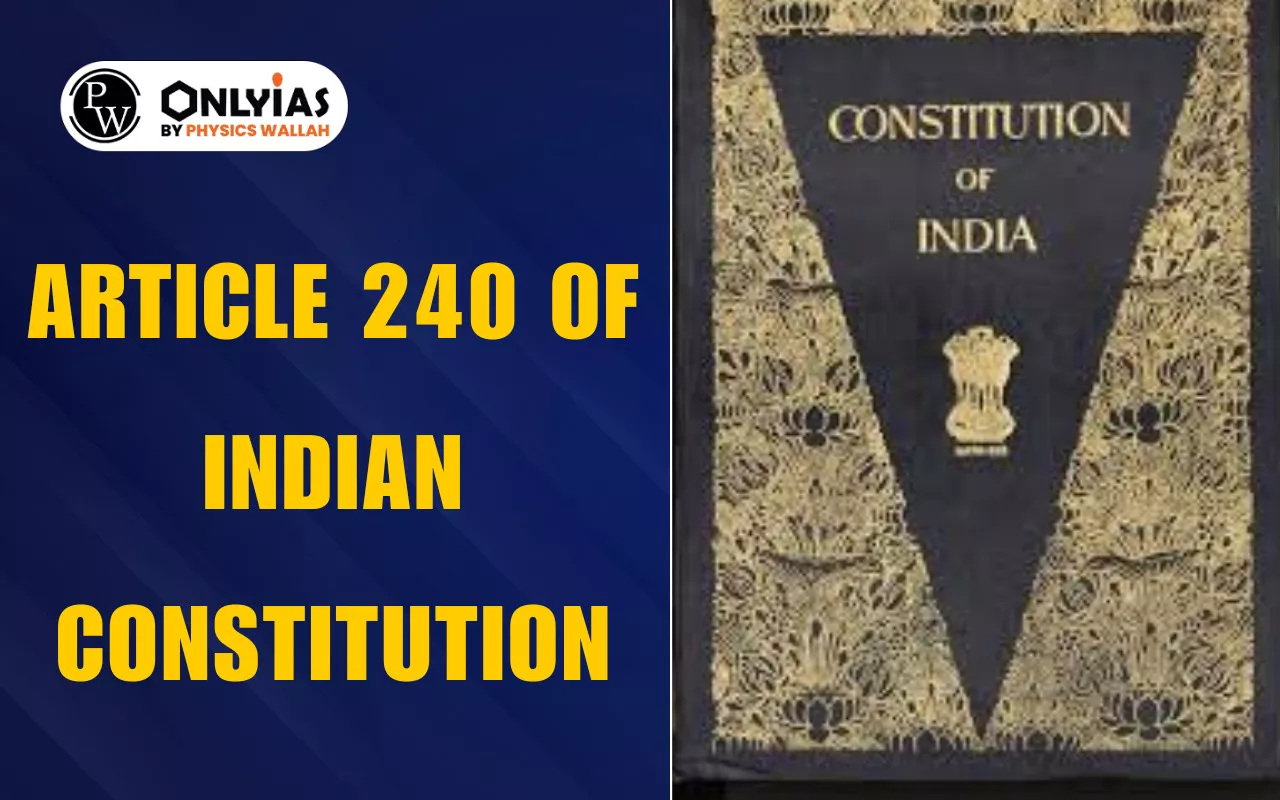Article 240 of Indian Constitution gives the President the power to make regulations for specific Union Territories for their peace, progress, and good governance. The 131st Amendment Bill 2025 proposes bringing Chandigarh under this article, which may give it an independent administrator.

Article 240 of Indian Constitution: The demand for an amendment in Article 240 of Indian Constitution has been heating up since the Indian government recently announced that Chandigarh is soon to be included in Article 240 of the Indian Constitution. Chandigarh is a Union Territory which is the joint capital of the states of Punjab and Haryana. The current Administrator of Chandigarh is the Governor of Punjab. However, as per Article 240, Chandigarh may have a separate administrator for the Union Territory as other Union Territories of the country have.
Article 240 states that the President has special powers to make rules for certain Union Territories for the peace, progress and good government of that Union Territory. The rules made under this article have the same power as of an act made by the Parliament. The rules made can amend or repeal previous acts in that Union Territory.
Article 240 of Indian Constitution deals with the power of the President to make rules for certain Union territories. The President of India can make rules for certain Union territories to ensure that it is peace, tranquillity and good government are maintained there. When the President passes a rule under Article 240 of Indian Constitution, that rule has the same effect as if it is made by the Parliament. This rule can also amend or repeal any earlier law in that Union territory.
This Article can be applied in Union Territories which don’t have a legislature of their own or where immediate help from the Union government is needed. This Article allows the central government to act swiftly whenever necessary to assist the Union territory.
Article 240 Chandigarh is a plan to bring Chandigarh under Article 240 of the Constitution of India. Currently, Chandigarh is a Union Territory of India, also serving as the joint capital for the Indian states of Punjab and Haryana. The Governor of Punjab also serves as the Administrator of Chandigarh. This arrangement, however, is set to change if Chandigarh were to come under the purview of Article 240.
Article 240 allows the President of India to make regulations for the Union Territories mentioned in this Article. This means that if Chandigarh were to be included under Article 240, the city can also receive a separate independent Administrator or a Lieutenant Governor as is the case with most Union Territories in India, removing the need for Chandigarh to be directly administered by the Governor of Punjab.
As per Article 240, the President can make regulations for the following Union Territories:
Important Note: Delhi and Jammu & Kashmir are NOT included under Article 240 because they have their own legislative assemblies governed by separate constitutional provisions.
Article 240 explains the powers of the President of India to make regulations for the administration of certain Union Territories. These regulations work like laws made by the Parliament. The goal of the article is to ensure smooth administration in UTs that do not have a complete legislative structure. Here are the key provisions:
Check Out UPSC CSE Books
Visit PW Store
The Constitution (131st Amendment) Bill, 2025 is a new proposal that aims to change the way Chandigarh is governed. The bill plans to place Chandigarh in the same group of Union Territories that do not have a legislature. This change will give the President more power to make regulations for the city under Article 240 of Indian Constitution.
Ready to boost your UPSC 2026 preparation? Join PW’s UPSC online courses today!
Article 240 was created with the intention that the President could frame quick and efficient regulations for small Union Territories (UTs). This would be helpful in keeping peace, progress, and good administration in those areas where no legislature is in operation.
Union Territories that do not have a legislative assembly fall directly under the President's rule. These include Andaman and Nicobar Islands, Lakshadweep, Dadra and Nagar Haveli and Daman and Diu, and Chandigarh, when placed under Article 240. Puducherry falls under President's rule only when the assembly is suspended or dissolved.
Article 240 gives the President the power to make regulations that are similar to the Acts of Parliament. This enabled the Central government to manage the UTs on an ad-hoc basis. Thus, it provided the administration with the facility of being able to legislate without delay on crucial subjects.
Yes. The regulations can amend or repeal local laws. Regulations made under Article 240 have the force and effect of an Act of Parliament. Thus, it helped the country to have a uniform and stable administration over those UTs under this Article.
Article 240 is important for Chandigarh now as its government is mulling to place the UT under the purview of this Article. The UT will be brought under this Article 240 through the 131st Amendment Bill, which is awaiting government approval.
<div class="new-fform">
</div>